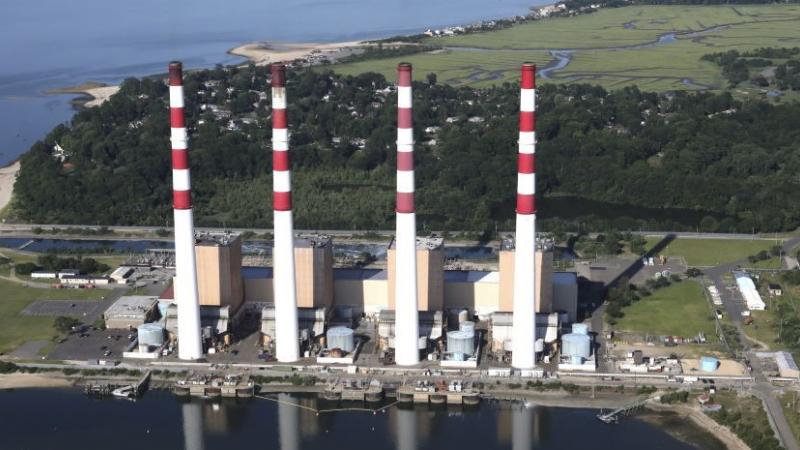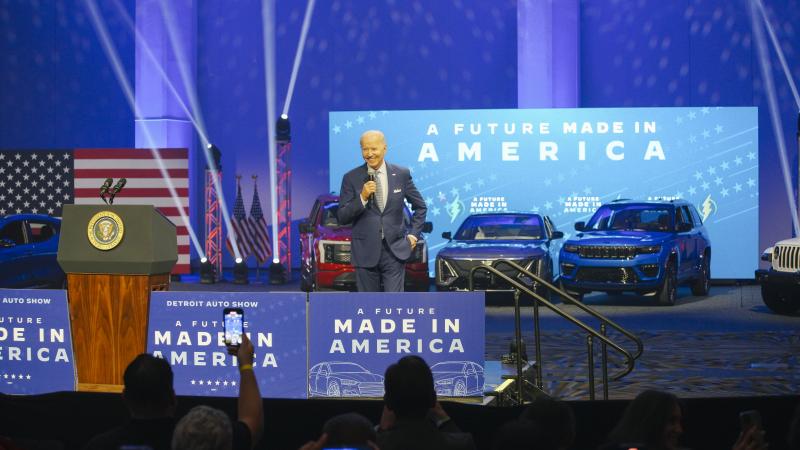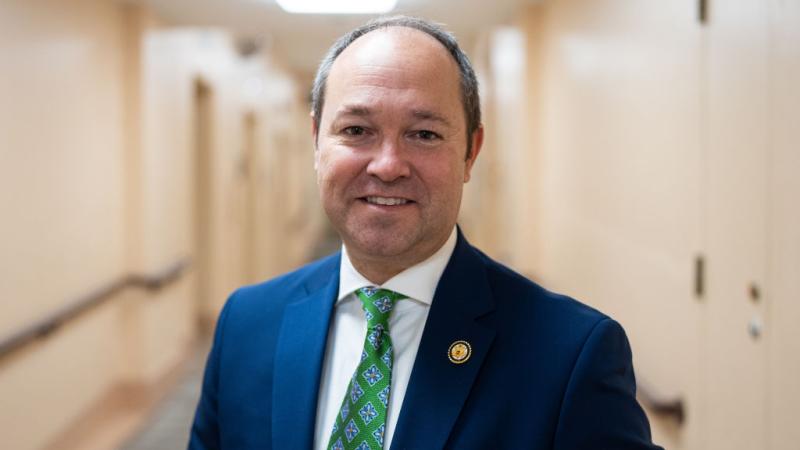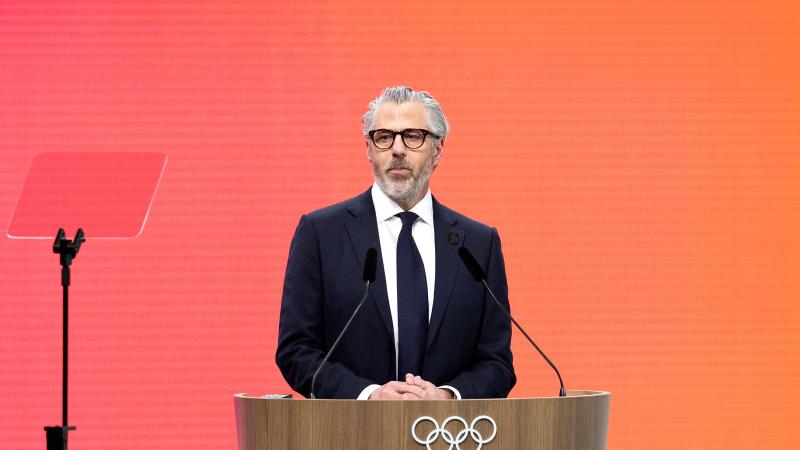Senators raise questions about EV mandates and subsidies going to China
“My problem is with an administration whose crusade is to convert everyone over to an EV regardless of where the battery came from,” Sen. Joe Manchin, D-W.Va., said.
The Senate Committee on Energy and Natural Resources has been scrutinizing the intersection of electric vehicle mandates and supply chains to meet them, and how EV subsidies could empower China, which controls a lot of those supply chains.
Sen. Joe Manchin, D-W.Va., chair of the committee, said he doesn’t have any problem with electric vehicles.
”My problem is with an administration whose crusade is to convert everyone over to an EV regardless of where the battery came from,” Manchin said.
Batteries contain a metal anode and cathode, which are differently charged to create a flow of electrons.
The issues came up in a hearing Thursday on Capitol Hill.
China, Manchin said, is responsible for 74% of the world’s cathode production and 92% of the world’s anode production. That’s on top of 76% of the lithium-ion battery production, and 60% to 100% of the world’s minerals processing, depending on the mineral.
Processing is where the minerals are extracted from the raw ore that’s mined.
“It doesn’t have to be that way,” Manchin said. “America and the Free Trade Agreement partners have the capacity to produce this for ourselves.”
Manchin praised the Inflation Reduction Act (IRA) and bipartisan infrastructure law, but said that their implementation is creating these problems.
While pursuing a “radical climate agenda,” Manchin said, the Biden administration is also breaking the law.
The administration’s proposed guidance for the percentage of minerals that must be extracted or processed in the U.S. or its Free Trade Agreement partners, Manchin said, is half that what the IRA required.
Taxes to China
Sen. John Barrasso, R-Wyo., ranking member of the committee, said that nothing President Joe Biden claimed about the IRA turned out to be accurate.
“The IRA stands for, to me, irresponsible, reckless and alarming,” Barrasso said.
A Goldman Sachs analysis, Barrasso said, estimated the electric car subsidies in the IRA will cost $393 billion, which is 28 times what the Congressional Budget Office (CBO) estimated.
”Our national debt is now $34 trillion, and thanks to the IRA, we are about to spend hundreds of millions of dollars we don’t have to subsidize electric cars that the great majority of Americans do not want,” he said.
Barrasso cited analyses by the nation’s grid watchdog, National Electricity Reliability Corporation, which has found the premature closure of coal- and natural gas-fired power plants is increasing risk of blackouts in many parts of the country.
“The Biden administration is working to shut down even more of these power plants, while promoting a huge new source of demand on the grid, which is of course electric cars,” Barrasso said.
Fully charging a single electric car, Barrasso said, consumes the same amount of power needed for an entire house during times of peak demand.
A 2024 Tesla Model 3 has a 57.5 kilowatt hour battery, which means to charge it from 0% to 100% would take 57,500 watt hours. The average American home uses about 30,000 watt hours per day, or about half what it would take to charge a dead EV battery to full.
Barrasso said the worst aspect of the IRA is that it provides subsidies that end up going to Chinese companies or companies that are “hostile to American interests.”
“You've heard the expression follow the money. Well, if you want to follow the IRA money, the so-called Inflation Reduction Act, you're going to need a passport because the money is going all over the world,” Barrasso said.
Manchin pushed back on the claim, saying that the IRA contains provisions to prohibit Chinese cars from getting tax credits in the U.S., to which Barrasso said it does have a loophole allowing the “least Chinese electric cars to qualify.”
Without China
David Turk, deputy secretary of the Department of Energy, defended the EV mandates.
He agreed that China has a stranglehold on the supply chains, especially when it comes to mineral processing. However, Turk argued, the IRA is providing funding that will develop domestic sources of these minerals, as well as the manufacturing component of the EV production chain, and this has leveraged $157 billion in private investment so far resulting in an estimated 136,000 direct jobs.
Graphite, a mineral vital to EV batteries, is almost 100% processed in China. Turk said that the IRA will allow domestic lithium to increase 13-fold by 2030, and in that time, graphite production will increase 25-fold.
“We can absolutely do this without China,” Turk said.
Turk said that EV prices, while higher than gas-powered vehicles now, are coming down in price, and consumers save money on maintenance and fuel as well.
He pointed to the Chevrolet Volt. The sell price for a new Volt is $27,495. With the federal $7,500 tax credit, a new 2023 volt would cost $20,000. According to Car and Driver, the Volt gets 259 miles on a full charge, and can add 100 more miles with 30 minutes of driving.
Barrasso pointed out that Hertz is going to sell 20,000 EVs to shift back to gas-powered vehicles due to higher repair costs and weak demand.
”The American public is seeing exactly the same thing and they're getting hit with similar bills. The damage that the IRA will do to America’s automotive sector is potentially catastrophic,” Barrasso said.
On the question of increased electricity demand destabilizing the grid, Turk said that the grid can become more resilient with bi-directional charging and incentives to get people to charge their vehicles during non-peak demand hours.
Bi-directional charging is a technology that allows the grid to tap into car batteries charging in people’s garages.
“What happens when an owner of an electric car has an emergency at 3 a.m. They go to their garage and find out their electric car is out of juice because this gobbledygook word of bi-directional charging has drawn them down?” Barrasso asked.
Turk said the consumers will have to opt into the program and will have to take into account emergencies.
”You'd need to do it in a smart way so that you don't have batteries too low that you can’t take advantage of it if you need to in emergency circumstances,” Turk said.
The Facts Inside Our Reporter's Notebook
Links
- minerals are extracted from the raw ore
- National Electricity Reliability Corporation
- increasing risk of blackouts in many parts of the country
- Tesla Model 3 has a 57.5 kilowatt hour battery
- average American home uses about 30,000 watt hours per day
- According to Car and Driver
- Hertz is going to sell 20,000 EVs to shift back to gas-powered vehicles
- technology that allows the grid to tap into car batteries















